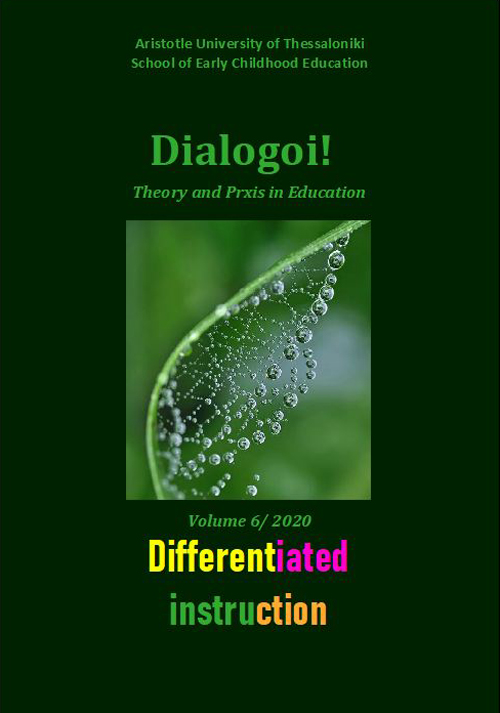Differentiated pedagogy in the context of inclusive education: researching the practices of final-year Early Childhood Education undergraduate students

Abstract
The research study presented below draws on research conducted in the context of Disability Studies employing the sociopolitical model of disability. It addresses the vexed issue of the education of the disabled, which, in the context of the research study is perceived as a fundamentally political, economic and cultural issue, apart from a pedagogical one. Based on statistics coming from international and European organizations research, as well as recent study findings, it becomes evident that the failure of the educational system to counterbalance the social and educational exclusion of disabled students remains a problem of paramount importance despite the fact that inclusive education has been both a guiding principle and a high priority in global educational policy agendas for decades. The main objective of broad global and more specifically European educational policies is the attendance of disabled students in mainstream schools with the appropriate conditions to enable active, equal and fair opportunities for participation in the educational process.
In this context, differentiated pedagogy offers the appropriate framework in order to address matters concerning heterogeneity and to unlock the liberating potential for diversity in Disability Studies by:
a) highlighting the critical issue of equitable education and equal access to education of all students and
b) adding emphasis with a view to inclusion of many kinds of diversity not as problematic challenges, but rather as sources of educational enrichment.
The present article attempts to inform the scholastic dialogue on inclusion regarding pedagogical practice, focusing on the differentiated pedagogical practices that enhance the perspective of inclusion on the one hand and highlighting those practices which constitute the key components of the Greek educational system on the other. Regarding the latter, the intention includes shedding light on the practices that arguably promote discrimination and segregation regarding education of the disabled, as well as discussing the practices that enhance a perspective of inclusion, currently being implemented within differentiated pedagogical contexts.
The research study records and analyzes the practices of final-year Early Childhood Education undergraduate students who are learning about inclusive education in differentiated educational interventions. The methodology is based on the premise that students as prospective teachers can strategically determine a scope for action and change, as well as the nature of the educational intervention practices.
In order to meet its objectives, this research employs a qualitative method towards analyzing the self-reporting assignments of undergraduate students during differentiated educational interventions, all of which were planned, implemented and self-evaluated during their student teaching internship.
The research study demonstrates that a synergy of theoretical discourse of differentiated pedagogy and inclusive education is being adopted by the undergraduate students as future educators who denounce exclusion and discrimination experienced by disabled students. Of particular concern is that despite the overwhelming acknowledgment by future educators of the significance of differentiated pedagogy and inclusive education, there appears to be a direct contradiction to the day to day reality of practicing differentiated pedagogy and inclusive education as professional practice. While future educators endorse diversity and claim commitment to human rights during their initial training, they are failing to consistently commit to practicing differentiated pedagogy and inclusive education during the next step while becoming educational professionals.Article Details
- How to Cite
-
Τσερμίδου Λ., & Ζώνιου-Σιδέρη Α. (2020). Differentiated pedagogy in the context of inclusive education: researching the practices of final-year Early Childhood Education undergraduate students. Dialogoi! Theory and Praxis in Education, 6, 209–238. https://doi.org/10.12681/dial.23328
- Issue
- Vol. 6 (2020)
- Section
- Special Theme

This work is licensed under a Creative Commons Attribution-NonCommercial-ShareAlike 4.0 International License.
Authors who publish with this journal agree to the following terms:
- Authors retain copyright and grant the journal right of first publication with the work simultaneously licensed under a Creative Commons Attribution Non-Commercial License that allows others to share the work with an acknowledgement of the work's authorship and initial publication in this journal.
- Authors are able to enter into separate, additional contractual arrangements for the non-exclusive distribution of the journal's published version of the work (e.g. post it to an institutional repository or publish it in a book), with an acknowledgement of its initial publication in this journal.
- Authors are permitted and encouraged to post their work online (preferably in institutional repositories or on their website) prior to and during the submission process, as it can lead to productive exchanges, as well as earlier and greater citation of published work (See The Effect of Open Access).


